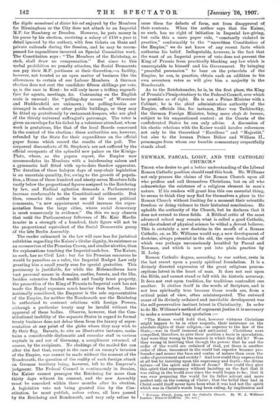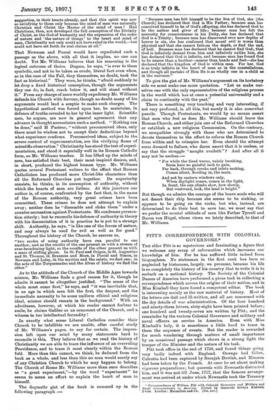NEWMAN, PASCAL, LOISY, AND THE CATHOLIC CHURCH.* THOSE who desire
to get 1 better understanding of the Liberal Roman Catholic position should read this book. Mr. Williams not only presses the claims of the Roman Church upon all who profess and call themselves Christians, but on all who acknowledge the existence of a religious element in man's nature. If his readers will grant him this one essential thing, he seems to think they may find for themselves a place in the Roman Church without limiting for a moment their scientific freedom or doing violence to their historical conclusions. He upholds the authority of the Church, but he declares that it does not extend to these fields. A Biblical critic of the most advanced school may remain what is called a good Catholic, and the student of physical science be withal a devout believer. This is certainly a new doctrine in the mouth of a Roman Catholic, or, as Mr. Williams would say, a new development of doctrine, always potential in the old, the open declaration of which was perhaps unconsciously heralded by Pascal and Newman, and which is now put into plain practice by H. Loisy.
Roman Catholic dogma, according to our author, rests in the last resort upon a purely spiritual foundation. It is a divinely directed expression of the great religious precon. ceptions latent in the heart of man. It does not rest upon the Bible, and cannot stand or fall with its historic accuracy. It does not rest upon tradition, for traditions contradict one another. It clothes itself in the words of Scripture, and is not less spiritually true because those words are, from a critical point of view, often misinterpreted. The outward cause of its divinely ordained and inevitable development was the self-preservative instinct latent in Christianity. In order to do Mr. Williams's method of argument justice it is necessary to make a somewhat long quotation :—
"The Roman world held that, however virtuous Christians might happen to be in other respects, their insistence on the absolute rights of their religion,—as superior to the law of the State,—was in itself immoral and anti-social. Christians were compelled, therefore, to give their position a basis in speculation. And were they wrong in the manner in which they did it ? Were they wrong in insisting that though the powers that be and the order of the world are ordained of God, yet there is another order of ideas, immanent in the world but superior because pro- founder and nearer the base and centre of nature than even the order of government and society ? And how could they express this at all but by insisting upon the supremacy and depth—the divine nature—of the spirit and ideas of Jesus ? How could they give this spirit that supremacy without insisting on the fact that it was ruling in the world ever since the world began to be; that it was ever preparing the world for its fuller advent and more perfect rule on the coming of Christ ; that the belief they had in Christ could itself never have been what it was had not the spirit which was in Christ's words long been rating, by implication and • Neuman. Pascal, Loisy, and the Catholic Church. By W. J. Williams London Francis Griffiths. [Sc. net.]
suggestion, in their hearts already, and that this spirit was now so satisfying to them only because the mind of man was naturally Christian and Christ the Master of the mind of man ? Had Christians, then, not developed the full conception of the Divinity of Christ, as the God of humanity and the expression of the order of nature and 'the nature of things' to the heart and mind of man, Christianity not only could not have ruled in the world,—but could not have set forth its real claims at all."
That Newman and Pascal would have repudiated such a passage as the above, with all that it implies, no one can doubt. Yet Mr. Williams believes that his reasoning is the logical outcome of theirs. Dogma, he says, "is ever to them symbolic, and not to be taken as crude, literal fact even when, as in the case of the Fall, they themselves, no doubt, took the fact as historical." They were, he thinks, "afraid suddenly to let drop a fixed historical conception, though the arguments they use do, in fact, reach below it, and will stand without IL" From any charge of mere worldly expediency Mr. Williams defends his Church with fervour, though no doubt many of his arguments would lead a sceptic to make such charges. The hypothetical method was forced upon her, he maintains, in defence of truths revealed to her by the inner light. Scientific men, he argues, are now in general agreement that any advance in thought necessitates such a method. "Nothing can be done," said M Pasteur, "without preconceived ideas, only there must be wisdom not to accept their deductions beyond what experience confirms. Preconceived ideas, subject to the severe control of experimentation, are the vivifying flame of scientific observation." Christianity has stood the test of experi- mentation, and stood it especially well in its Roman Catholic form, so Mr. Williams teaches. It has lifted up the minds of men, has satisfied their best, their moat inspired desires, and, in short, produced the highest human type. Mr. Williams quotes several Protestant writers to the effect that Roman Catholicism has produced more Christ-like characters than all the Reformed Churches put together. Its superiority consists, he thinks, in its assumption of authority, without which the hearts of men are listless. At this juncture our author is, of course, confronted by the fact that, in the name of the Roman authority, very great crimes have been committed. These crimes he does not attempt to explain away ; neither does he "dissemble and cloke them" under a counter-accusation against Protestants. He condemns persecu- tion utterly ; but to reconcile his defence of authority in theory with his denunciation of it in practice he is put to a strange shift. Authority, he says, "is like one of the forces of nature, and may always be used for evil as well as for good." Throughout the history of the Church, he assures us, "two modes of using authority have run parallel to one another; and as the results of the one present us with a stream of ever-broadening light, so the results of the other present us with a mass of stifling gloom. In St. Paul and Origen, in St. Augustine
i
and St. Thomas, n Erasmus and More, in Pascal and Simon, in Newman and Loisy, in the mystics and the saints, we find one; in the acts of the Torquemadas and the Alves of history we find the other."
As to the attitude of the Church of the Middle Ages towards science, Mr. Williams finds a good reason for it, though he admits it cannot be altogether justified. "The sense of the whole must come first," he says, and "it was inevitable that, in an age in which men felt the first, the deepest, and the immediate necessity to be some uniform ethical and religious ideal, science should remain in the background." With an adroitness, however, at which his reader cannot forbear to smile, he claims Galileo as an ornament of the Church, and a witness to her intellectual fecundity !
In exactly what sense Liberal Catholics consider their Church to be infallible we are unable, after careful study of Mr. Williams's pages, to say for certain. The impres- sion left upon our mind by many statements hard to reconcile is this, They believe that as we read the history of Christianity we are able to trace the influence of an overruling Providence, and to trace it most clearly within the Roman fold. More than this cannot, we think, be deduced from the book as a whole, and less than this no man would surely say of any Christian Church to which he may happen to belong. The Church of Rome Mr. Williams more than once describes as "a great experiment,"—by the word "experiment" he seems to mean an effort to explain the heart of man to himself.
The dogmatic gist of the book is summed up in the following paragraph :--
"Because man has felt himself to be the Son of God, she [the Church] has declared that God is His Father; because man has conceived 'himself to be of God's offspring, she has declared God to be the author and giver of life; because man has felt the necessity for consciousness in his Deity, she has declared that God is a Trinity ; because man has discovered ever new depths of horror in sin, she has confessed that moral evil is worse than physical and that she cannot fathom the depth, or find the end, of hell. Because man has declared that he cannot find God; that God is infinitely distant from him and infinitely unlike him, she has declared that God is infinite, and because man has found God to be nearer than a brother—nearer than hands and feet—she has declared that the kingdom of God is within man. For her. God is as truly infinite in the heart of man as in the constellations, and though all partake of Him He isas wholly one in a child as in the universe."
To give the gist of Mr. Williams's argument on its hortatory side we must make one more quotation. "Let us make our- selves one with the only representative of the religious process in the world which has at once a potential universality and a claim to continuity with the past."
There is something very touching and very interesting, if not very profound, in all this, but surely it is also somewhat puerile. Though Protestants, we would by no means assert that men who feel as does Mr. Williams should leave the Roman Church, and either join one of the Reformed Churches or establish a new religious Communion. On the contrary, we sympathise strongly with those who are determined to devote themselves to the effort to reform the Roman Church from within and to reinapire her. Even should the attempt seem doomed to failure, who dares assert that it is useless, or say that the struggle "naught availeth" ? And after all it may not be useless :—
" For while the tired waves, vainly breaking, Seem here no painful inch to gain, Far back, through creeks and inlets making, Comes silent, flooding in, the main.
And not by eastern windows only,
When daylight comes, comes in the light, In front, the sun climbs slow, how slowly, But westward, look, the land is bright."
But though we admire the courage of the brave souls who will not desert their ship because she seems to be sinking, or appears to be going on the rocks, but who, inatead, are determined to do their best to save her, we must say that we prefer the mental attitude of men like Father Tyrrell and Baron von Hugel, whose views we lately described, to that of Mr. Williams.























































 Previous page
Previous page